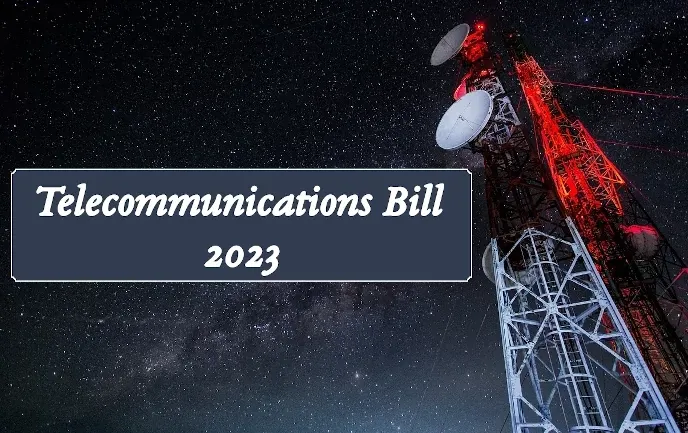The telecom bill was first released in 2022, but the central government tabled it due to unknown reasons.
The Telecom Bill 2023 empowers the government to assume control over telecommunications services, permitting message interception in the interest of national security and during emergencies.
Its primary objectives include the regulation of telecommunication activities by encompassing internet-based calling and messaging apps (like WhatsApp, Telegram) within the definition of telecommunications. This expansion aims to bolster user safety.
Furthermore, the bill aims to annul:
- the 138-year-old Indian Telegraph Act of 1885,
- the Indian Wireless Telegraphy Act of 1933, and
- the Telegraph Wires (Unlawful Possession) Act of 1950.
Another important provision of the Telecommunications Bill, 2023 for the common man is that it makes it mandatory for companies to issue SIMs after obtaining verified biometric data from the user.
It also stipulates up to three years in prison or a fine of up to Rs 50 lakh for obtaining a SIM or other telecom resource by deception, deception, or impersonation.
Key Propositions in the Telecom Bill of 2023
Assignment of Spectrum:
- national security and defense,
- disaster management,
- weather forecasting,
- transport,
- satellite services such as DTH and satellite telephony, and
- BSNL, MTNL, and public broadcasting services.
This change could significantly benefit companies like Bharti Airtel’s OneWeb, Elon Musk’s Starlink, and Amazon’s Kuiper.
Authorization for Telecom-related Activities:
- provide telecommunication services,
- establish, operate, maintain, or expand telecommunications networks, or
- possess radio equipment.
User Protection:
The central government may institute measures safeguarding users, including -
- prior consent for receiving specific messages (e.g., advertisements),
- establishing "Do Not Disturb" registries, and
- setting up mechanisms for reporting malware or particular messages.
Telecom service providers must create online avenues for registering and addressing grievances.
Interception and Search Powers:
Right of Way:
- Telecom facility providers can request permission to access (Right of way) public or private property for establishing telecom infrastructure.
- Right of way should be granted impartially and without exclusivity to the maximum extent feasible.
TRAI Appointments:
The bill amends the Telecom Regulatory Authority of India (TRAI) Act, 1997 to also allow individuals with:
- at least 30 years of professional experience to serve as the chairperson and
- at least 25 years of professional experience to serve as members.
Adjudication Process:
Rulings made by the adjudicating officer can be challenged before the Designated Appeals Committee within 30 days. Committee members must hold a rank of at least Additional Secretary.
For appeals related to breaches of terms and conditions, parties may file appeals with TDSAT (Telecom Disputes Settlement and Appellate Tribunal) within 30 days against the Committee's orders.
Offenses & Penalties:
The bill outlines various criminal and civil offenses.
- Providing telecom services without authorization, or gaining unauthorized access to a telecom network or data, are punishable with imprisonment of up to three years, a fine of up to two crore rupees, or both.
- Breaching terms and conditions of authorization is punishable with a civil penalty of up to five crore rupees.
- Possessing unauthorized equipment, or using an unauthorized network or service, is punishable with a penalty of up to ten lakh rupees.
Digital Bharat Nidhi
Universal Service Obligation Fund (USOF)
Currently, USOF has surplus cash of around 78,000 crores, the majority of which lies unutilized.
Criticisms of Telecom Bill 2023
Privacy Concerns:
Pointing to potential privacy infringement, Member of Parliament Ritesh Pandey opposed the bill introduction also on the ground that it violated the Supreme Court's landmark ruling in K.S. Puttaswamy (2017), in which the right to privacy was recognized as a facet of the right to life under Article 21 of the Constitution.
Data Security and Misuse:
Complete Bill can be read from Here
📝 SideNotes:
- World Telecom Day – May 17.
- Theme of World Telecom Day 2023 – Empowering the least developed countries through information and communication technologies.
- Union telecom and IT minister – Ashwini Vaishnaw.
- Chairman of Telecom Regulatory Authority of India (TRAI) – Anil Kumar Lahoti.
- Internet and Mobile Association of India (IAMAI) –
- Founded – 2004.
- Headquarters – Mumbai.
- a not-for-profit representative body of approximately 600 internet firms and start-ups.
- Other important bills passed by Lok Sabha on December 20, 2023 – 3 criminal bills replacing the colonial Indian Penal Code and the CrPC.
- The Bharatiya Nyaya (Second) Sanhita, 2023,
- the Bharatiya Nagarik Suraksha (Second) Sanhita, 2023,
- the Bharatiya Sakshya (Second) Bill, 2023.







Post a Comment
Post a Comment